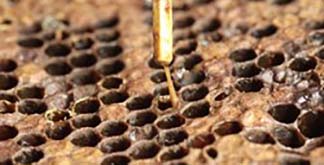

The ‘ropiness’ test is a typical sign of American foulbrood infestation
PIRSA Biosecurity SA is reminding beekeepers to be on the lookout for American foulbrood (AFB) following a detection in hives in the Mount Barker area.
AFB is a notifiable bacterial disease that kills honeybee brood, resulting in the weakening and eventual death of affected hives.
General Manager of Plant and Food Standards at Biosecurity SA, Dr Ross Meffin, said AFB is spread via infected honey bees, honey bee products and equipment. As such, it was vital that anyone keeping hives, whether a commercial or backyard keeper, maintain an effective honey bee biosecurity program.
“Good bee biosecurity is not only crucial to the honey bee industry but also for the agricultural and horticultural sectors that are dependent on honey bee pollination,” said Dr Meffin.
“We urge all local beekeepers to be vigilant and thoroughly inspect brood frames for the disease. If you find or suspect AFB in your hives, please contact us as soon as possible to discuss diagnosis, sampling and control. If necessary we can organise a visit to undertake an inspection.”
Signs of infected brood include:
Management options for AFB eradication include the destruction of infected honey bees and the sterilisation or destruction of hive equipment.
President of the Beekeepers’ Society of South Australia (BSSA), Susan Lonie, said this latest detection serves as a timely reminder to all beekeepers regarding their responsibilities.
“This includes being registered with PIRSA who can then assist in the event of a disease detection, managing their hives to prevent both disease spread and nuisance,” said Ms Lonie.
“All beekeepers should be regularly inspecting their hives not only for disease, but also to prevent swarming.”
To assist beekeepers, disease spread and swarming will be among the topics discussed at the next BSSA meeting on 7 October 2019 at Burnside. Visitors are most welcome. For further details contact office@bees.org.au
Beekeepers seeking further information on AFB and other honeybee diseases should visit www.pir.sa.gov.au/animal_health/bees
Acknowledgement: This article was reproduced from a news item by the Department of Primary Industries and Regions South Australia.